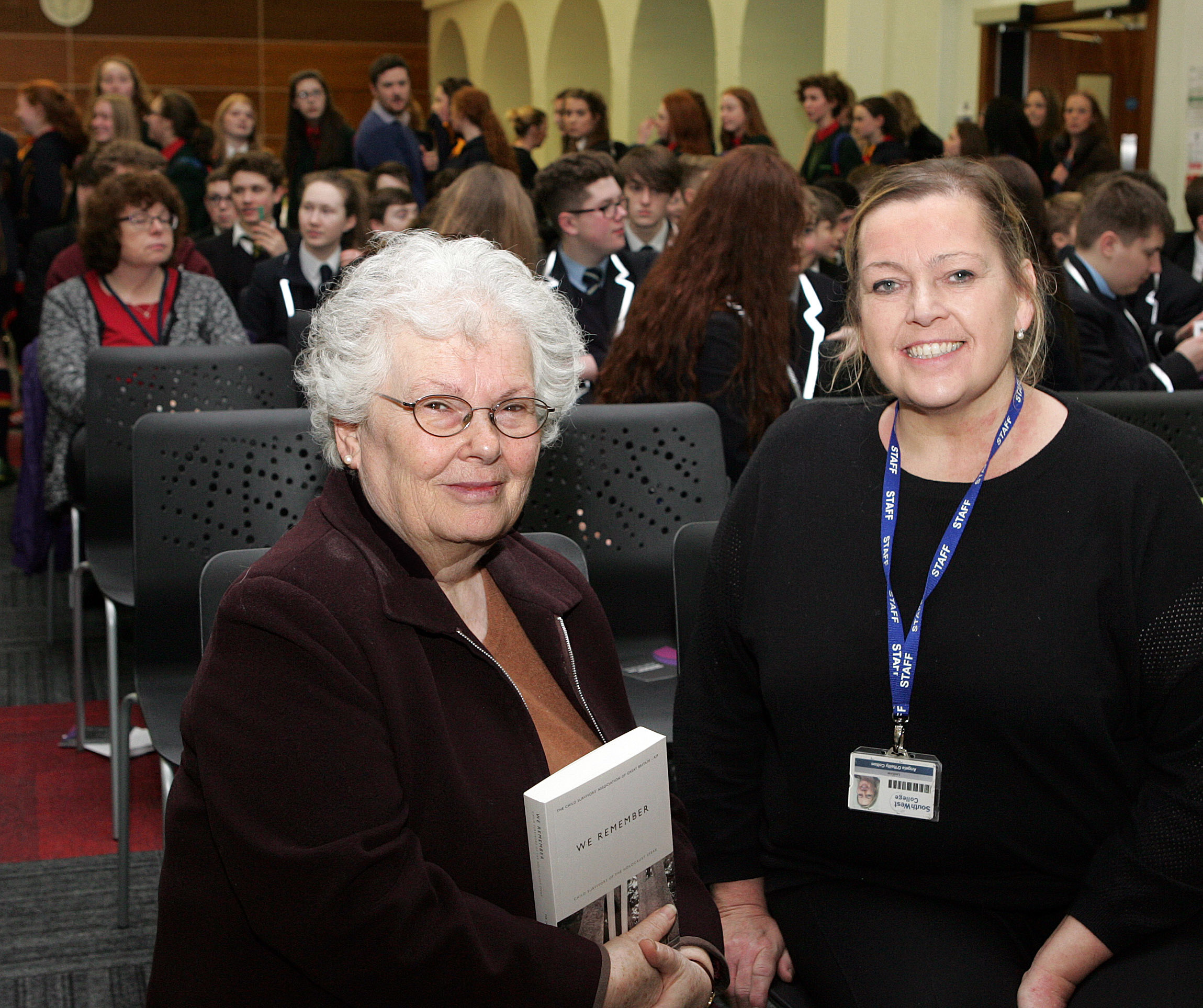Joanna Millan was born Bela Rosenthal in Berlin in August 1942, in the midst of the holocaust. At less than a year old her father was sent to Auschwitz and murdered on arrival, a few months later her and her mother were sent to Theresienstadt in Prague, and before Bela was eighteen months old, her mother contracted tuberculosis and died there, leaving her orphaned and alone, in a camp where it was believed ‘there was no way out, except in death.’ Having survived this time, Joanna’s story, which she delivers to a hall full of students, is introduced as one ‘which demands telling and demands listening.’ Throughout it she displays a sadness and regret at what happened in Europe at this time, but also emits a simple hope to the students she’s addressing: ‘maybe your generation can do better.’
That Joanna is here to tell her story is in itself statistically unlikely. Throughout the holocaust, Hitler's Nazi Germany and its collaborators killed around six million Jews, which made up two-thirds of the nine million Jews who had resided in Europe at the time. Ninety percent of the Jewish children in Europe died, making Joanna one of the minority that survived. As such, she admits that giving talks on the subject, and telling her story and that of her family, is a duty she has to fulfil. She explains, ‘it’s an obligation. When only a few of us are here to talk about it, we have to do it, so the truth is not destroyed by revisionism or even innocent mistake. I owe it to my family to say this really happened and to ensure it doesn’t happen again.’
Joanna has spent most of her adult life researching the holocaust, and her historical understanding is as prevalent as her personal experience.
Having been born into the holocaust and experienced it at such a young age, Joanna has spent most of her adult life researching it, and her historical understanding is as prevalent as her personal experience. According to her, ‘it’s a bit of both. I’ve met family who have photos and information from people who were there. I’ve double, treble checked everything. I know it’s accurate.’ From her delivery, this is never in doubt, and when she speaks it’s easy to think you’re listening to a history lecturer rather than a survivor.
Acquiring this level of understanding has been a long journey. Joanna says, ‘It’s taken me a long time to piece everything together, but in 1989 I decided I had to start.’ 1989 was also the year the Berlin wall came down, and Joanna explains how that was important for her journey. ‘That was significant because it was where my parents lived and where the Jewish cemetery and the Jewish hospital were, where people were born, where the Nazi archives were. Everywhere I wanted to visit was in East Berlin, and of course at that time Russians didn’t like visitors very much, and so as soon as the wall came down I thought this was the opportunity to go and start, and go and see where my parents lived and so on.'
Joanna’s journey started by going to the Jewish cemetery, where she found her grandfather’s grave, and her story from there is one of admirable historical research. She explains, ‘I eventually got access to the Nazi archives, to the Red Cross archives, and found information and photographs and documents.’ She has also availed of emerging online resources, and even travelled to Europe and America to meet distant relatives, in order to discover the story of her family through the holocaust and beyond.
 Joanna Millan - Holocaust Survivor
Joanna Millan - Holocaust Survivor
This research alongside Joanna’s own story as a survivor allows her to give a unique insight, and addressing the students, she goes through the story, both hers and that of the holocaust in general, beginning with how the Nuremberg laws, an extreme set of anti-Semitic laws in Nazi Germany, were introduced in 1935, shortly after the Nazis were elected. The Nuremberg laws saw German citizenship revoked from Jewish people, and Jewish identity cards introduced; slave labour began, and Jewish people lost their access to transport and recreation; children were taken out of school, higher education opportunities were taken away, and Jewish people were no longer permitted pets or bicycles, amongst other things.
These circumstances were at once universal for Jewish people, and also deeply personal. Joanna shared a story about her grandmother, who was the first of her family to be deported to a camp in December of 1942. Many died on the train to Auschwitz, and although Joanna's grandmother arrived alive she was immediately taken to one of the gas chambers. Joanna explains how there were pegs outside of the chambers for people to hang items of clothing, and wonders aloud ‘why on earth did they bother to number the pegs? Everyone was going to die anyway.’ She answers her own question, explaining that they wanted to give the illusion that those going in might be coming back out. ‘In the Nazis mind,' she says, 'they wanted people to be calm, and go in an orderly fashion, quietly without resisting.’
More of these personal stories come when Joanna speaks about her own experience in Theresienstadt concentration camp, established by the SS during World War II in German-occupied Czechoslovakia.
Read more of Joanna’s story in #WOW Meets Joanna Millan Part 2, coming soon.